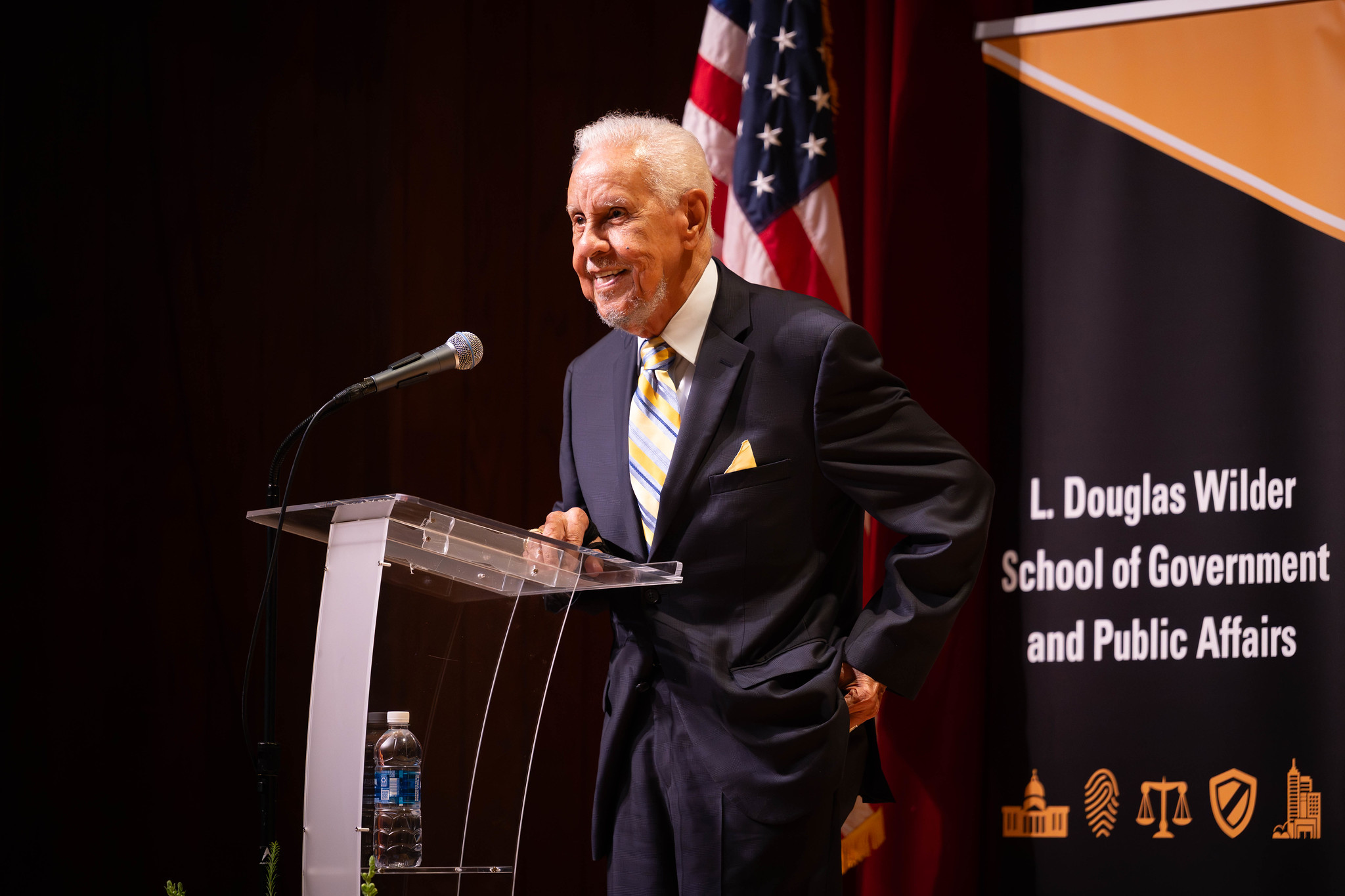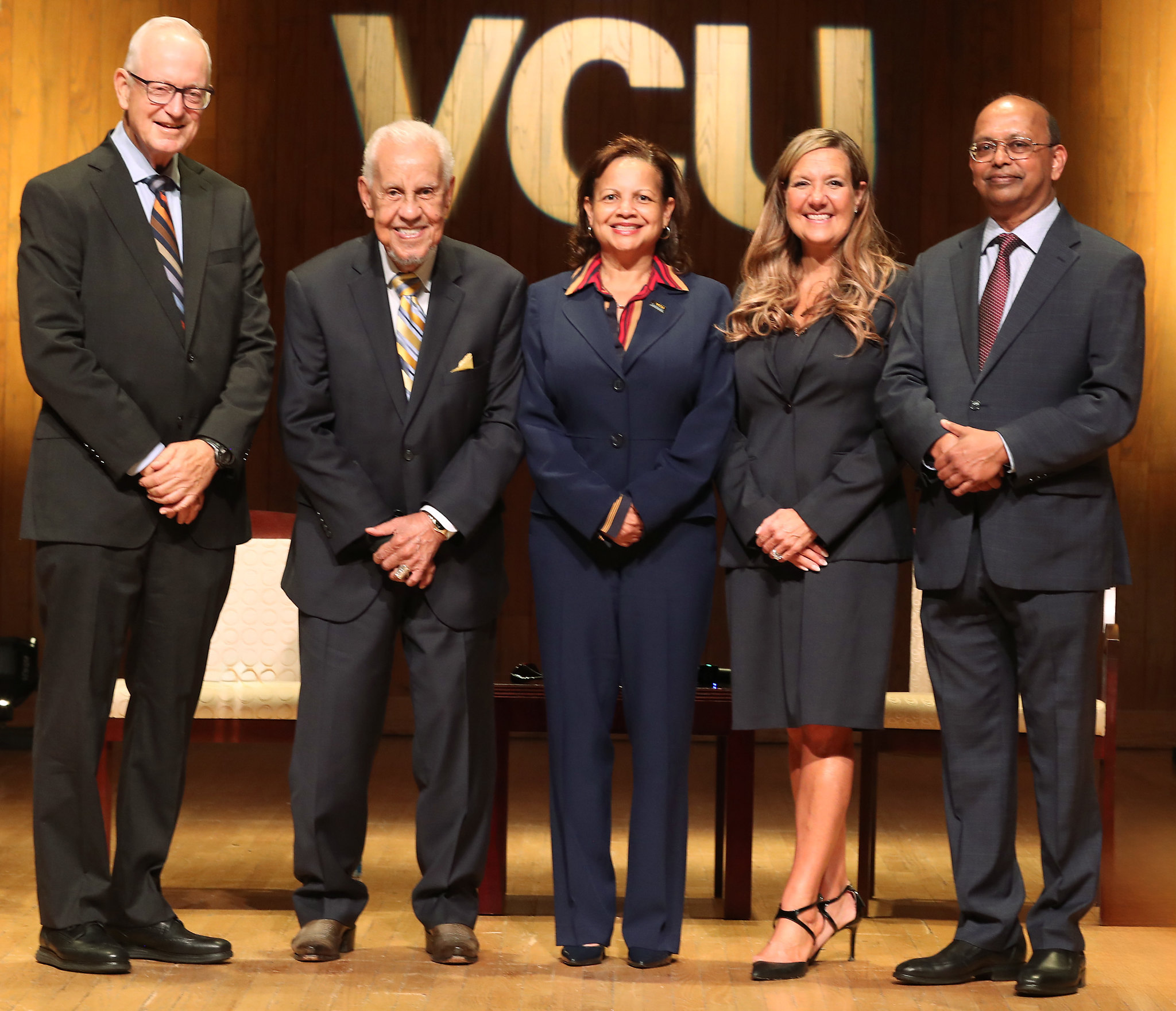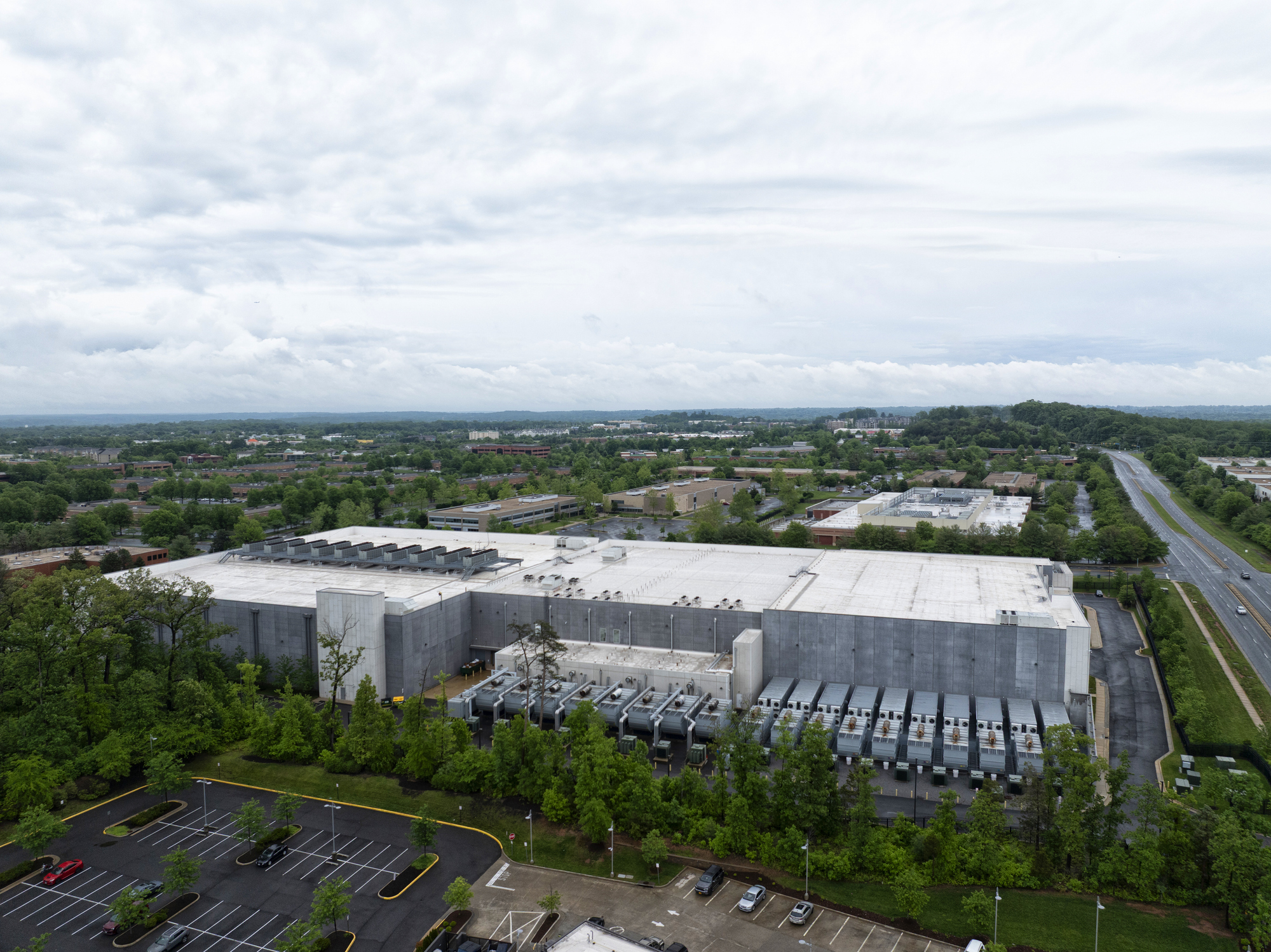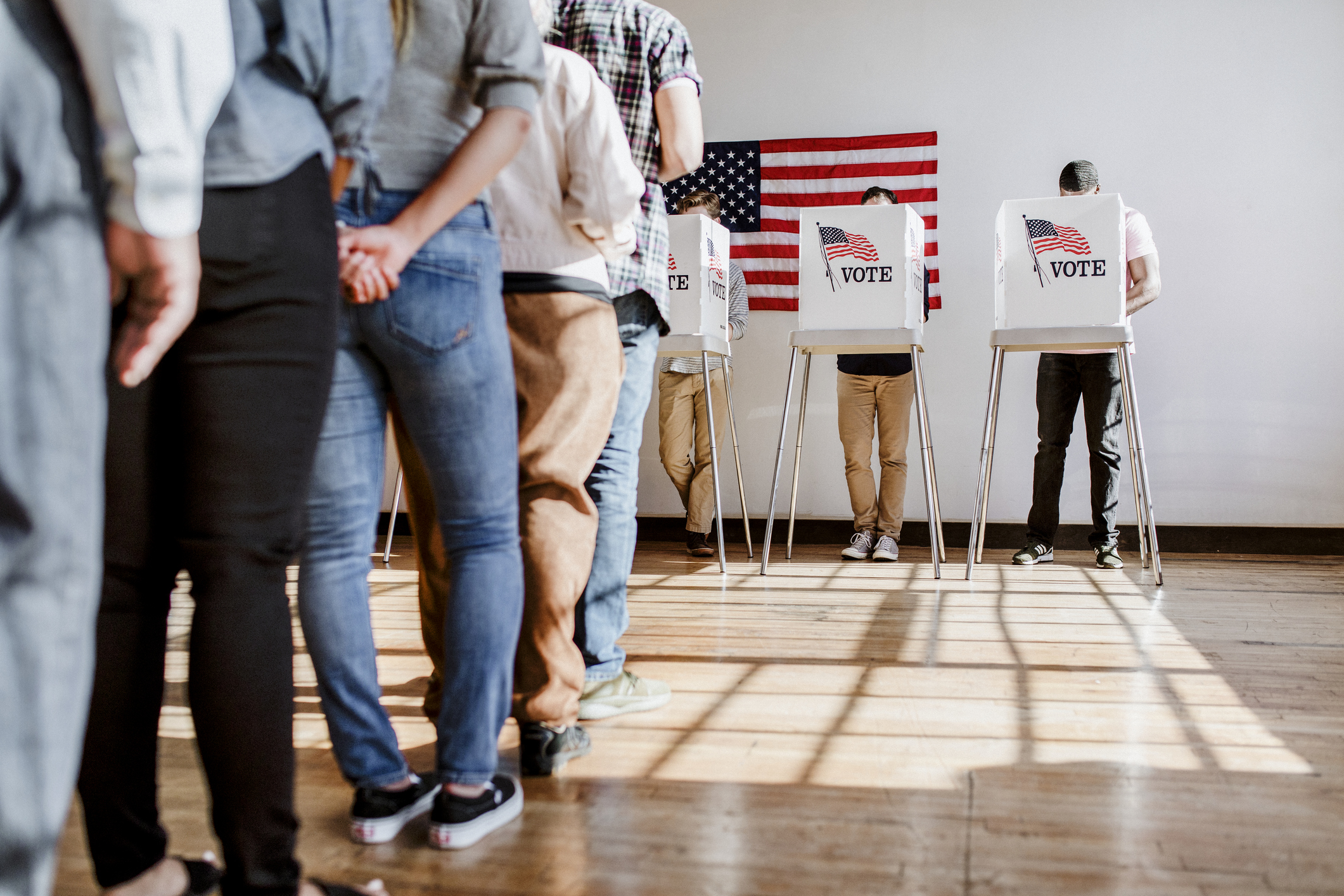As Virginians prepare to elect the state’s first female governor, panelists at the Wilder Symposium examined the growing ranks of independents, eroding trust, and why the commonwealth once again reflects the nation’s democratic struggles.
With just weeks until Virginians elect their next governor, the 2025 Wilder Symposium returned to its central question: What does democracy look like in a state that so often tells the nation where it is headed? For 90 minutes inside the W.E. Singleton Center, Bob Holsworth, Ph.D., a leading voice on Virginia politics and the founding director of the L. Douglas Wilder School of Government and Public Affairs at Virginia Commonwealth University guided the conversation, as panelists traced the election’s paradoxes, voters’ anxieties and the harsh realities that tie Virginia to the rest of the country.
The evening carried the weight of history. Virginia is poised to elect its first female governor, either Democrat Abigail Spanberger or Republican Winsome Sears. Nearly half of the electorate identifies as independent. Cost of living ranks as the single biggest issue. And unlike most states, Virginia draws outsized attention because of its timing: along with New Jersey, the commonwealth is one of only two states that hold gubernatorial elections in off-cycle years, offering a rare glimpse into the national mood between presidential and midterm contests.
>> Watch the complete video on YouTube
>> View and download event photos on the Wilder School Flickr page
Governor L. Douglas Wilder, the symposium’s convener and the nation’s first elected Black governor, and a distinguished professor at the Wilder School, reminded the audience what is at stake. “America is still in search of itself—searching to find out that promise, the fulfillment of that promise, the ability to say we don’t have it all right, but let’s correct what we can that is wrong,” he said. His words set the tone: democracy not as a finished product but as a continual act of correction.
For Wilder, the question is invariably concrete. “Ask them, what have you done? What have you tried to do? What have you accomplished? I didn’t ask you what you believed in. What have you done?” he pressed, leaning forward. The impatience was not with voters but with the political class, a demand for receipts instead of rhetoric. “Don’t you let anybody tell you that money doesn’t talk,” he added. “Don’t let them tell you that money doesn’t take its place and have its place — but the people are still in charge.”
“America is still in search of itself—searching to find out that promise, the fulfillment of that promise, the ability to say we don’t have it all right, but let’s correct what we can that is wrong.”
– Governor L. Douglas Wilder
If Wilder supplied the moral urgency, Robyn McDougle, Ph.D., associate dean for research and outreach at the Wilder School and director of the Commonwealth Poll, brought the numbers. She outlined what the data shows about Virginians this year: a restless, skeptical electorate increasingly unwilling to align neatly with either party. “Independents are a growing body. They are individuals who are not identifying by party, but instead are making decisions by issue…Almost half of the population is independent and undecided.” The figure landed heavily in a state where a 9-point lead, Spanberger’s current margin, still feels fragile.
McDougle detailed the issues that rise above the partisan noise, echoing findings from the Wilder School’s most recent Commonwealth Poll. “Cost of living is the number one reason Virginians are showing up to vote in this gubernatorial election… The second issue is women’s reproductive rights, and the third is immigration.” Beneath those concerns runs a deeper fracture: trust. “Eighty-nine percent of respondents said they do not think that our government spends their money responsibly. That’s an erosion of trust in our structure and our government systems.”
Where McDougle saw numbers, Niraj Verma, Ph.D., former dean of the Wilder School, saw caution. He urged against reading polling or even campaign finance as destiny. “The real test is going to be how many people can each candidate touch? How many doors do you knock? How hard do you work? Where is your team going? There is no constituency that can be taken for granted, whether it’s African Americans, Asian Americans, white men, white women, gay, lesbian, whatever.”
Verma warned of the distortions of modern campaigns. “There has been a 28-fold increase in Super PAC funding between 2010 and 2024…dark money now stands at $1 billion. If money is not a clear bellwether and polling is questionable, then how do we go about this?” His answer, like Wilder’s, was in the human act of campaigning — face-to-face encounters, local trust.
Susan Gooden, Ph.D., dean of the Wilder School, took the microphone with a different approach: paradoxes. She pointed out the silence around what might otherwise be a defining moment. “Regardless, we know Virginia is going to elect our first female governor. That’s a historic first… But the paradox is that for all the history, there is very little discussion about it.” Another paradox, she noted, was in the diversity of the ballot. “Where is the talk of that?… For all the debate about DEI, we have very little conversation about the diversity that has brought these candidates to the fore.”
Her analysis extended to the economy. “Virginia is in the top three states for the highest rate of layoffs… yet our unemployment rate is below the national average. It’s individuals in the lower middle class who are being dramatically impacted by the cost of living.” And finally, she turned to the figure looming over every conversation in American politics: President Donald Trump. “Virginians are talking about Trump… but Trump is not talking about Virginia. There’s been no campaign rally here, no endorsement of Winsome Sears. That’s an interesting paradox.”
While Wilder, McDougle, Verma, and Gooden built the case piece by piece, Holsworth tied it together. He reminded the audience that state elections here rarely stay contained.
“If Abigail Spanberger loses, it’s a catastrophe for the Democrats nationally… If she wins and the Democrats pick up seats in the House of Delegates, that will send shudders through Republicans in Congress who have to run in purple districts in 2026.”
– Bob Holsworth
Holsworth cast Virginia as a first draft of the midterms. He pointed to earlier races: Ralph Northam’s 2017 victory in the shadow of Trump, Glenn Youngkin’s 2021 win as President Biden’s numbers faltered, and Terry McAuliffe’s earlier loss, which foreshadowed national Democratic struggles. “The first election of 2026 is happening in Virginia,” he said, underscoring that what looks like a state contest doubles as a test case for both parties’ national strategies.
The discussion did not end with the panelists. Audience members pushed the conversation further, asking about feminism, executive power, campaign finance and Trump’s shadow. One question pressed whether feminism has shaped the race. Gooden’s response was striking: “We’ve got a diverse group of candidates, but we don’t have what I would say is identity politics coming alongside that. Issues of identity have been way muted.”
Another asked whether Republicans risk ignoring that Democrats will one day inherit the same executive powers they now embrace. Verma answered bluntly: “Future value is always discounted when you consider it in the present, and people forget that the future catches up with them.”
Money in politics returned again, this time through an audience challenge. Wilder did not hesitate. “I don’t know that we can do anything unless the Supreme Court changes… Money should not be the limit as to what a person can do, but when election time comes, that’s where the money is sometimes wasted.”
And the Trump question hovered. Would an endorsement of Winsome Sears change the race? McDougle doubted it. “Some could argue that could help turn out that base… but I don’t think it’s going to be enough to tighten that margin enough to have an impact.”
The questions sharpened the evening’s themes: the absence of identity politics even in a diverse race, the risks of short-term political thinking, the corrosive reach of money, and the unpredictability of Trump’s role.
By the time the evening closed, the threads were clear. Wilder’s demand for accountability. McDougle’s portrait of independents and eroding trust. Verma’s reminder that politics is still about ground games, not just money. Gooden’s paradoxes, holding together contradiction and truth. Holsworth’s insistence that Virginia is never just about Virginia.
And then Wilder closed it, with unmistakable clarity: “Don’t give up. Fight the fight. God bless.”
It was a fitting conclusion to a conversation that acknowledged the fractures in public trust but also the persistence of civic life. Virginians, like all Americans, remain skeptical of government but unwilling to step away from the work of democracy. In that tension, the commonwealth continues to reflect the nation — flawed, searching, but stubbornly vital.




.jpg)